

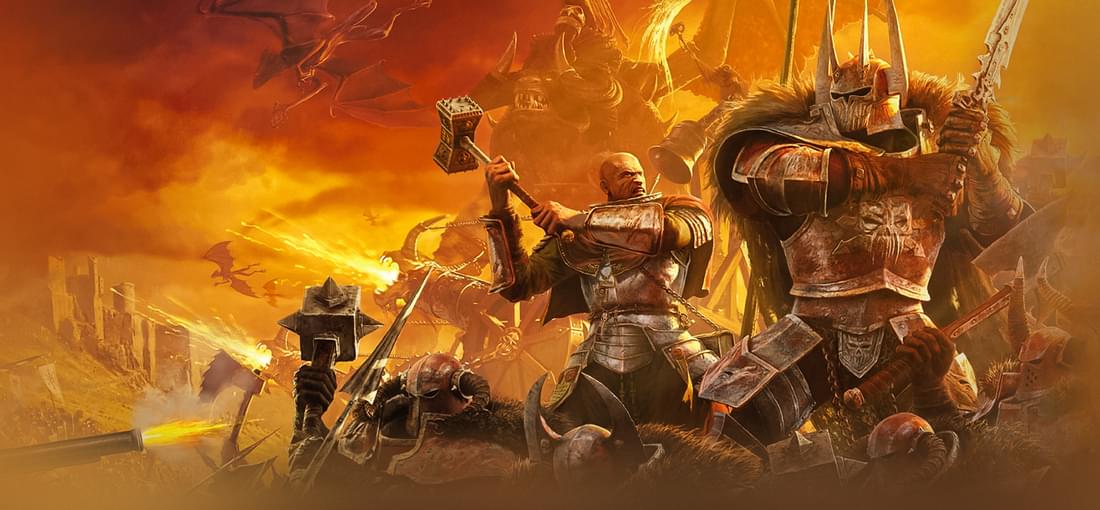
I picked up Mark of Chaos on release expecting a fantasy-flavoured Dawn of War, which is very much not what I got. Despite the related franchise, similar art style and even composer, Mark of Chaos is a very different game that left me cold in 2007 but I'm come to really appreciate today. In mechanics, MoC much more heavily inspired by the tabletop game. Instead of base building, armies are assembled out of game, and many of the mechanics like formations, charging, fleeing and scatter feel a bit confusing on their own but make more sense when tied to the dice-heavy game that inspired them. But "inspired" is the word, not "adapted"; the game does feel much simpler and less chance-based to accommodate real-time play. This gives MoC something of an identity crisis. It's not a tabletop adaptation, nor a simulation like Total War- it's something in between. This is most evident in the campaign, which rather than the tactical lay of a TW game has you play through a linear string of missions with an ever-growing roster of units and upgrades. It works, although doesn't quite feel complete. I have other quibbles; ranged units can swing fights a bit too easily, hero abilities feel a bit uneven, morale plays less of a role than it should... but the pure focus on combat was something I really came to appreciate. There's very little bloat in Mark of Chaos, the focus is very much of making good, quick decisions. While the strategy isn't deep, small mistakes have big consequences. Getting a fight "right", with minimal casualties is very satisfying, and the variety in the campaign missions kept me engaged until the end. It's not Dawn of War, it's not Total War, it's not the tabletop game, go in expecting any of those things, as I did, and you'll be disappointed. It's it's own thing, and what it does, it does well. If you like strategic games but don't have the time to learn what a "failed charge" is, this isn't a bad option.
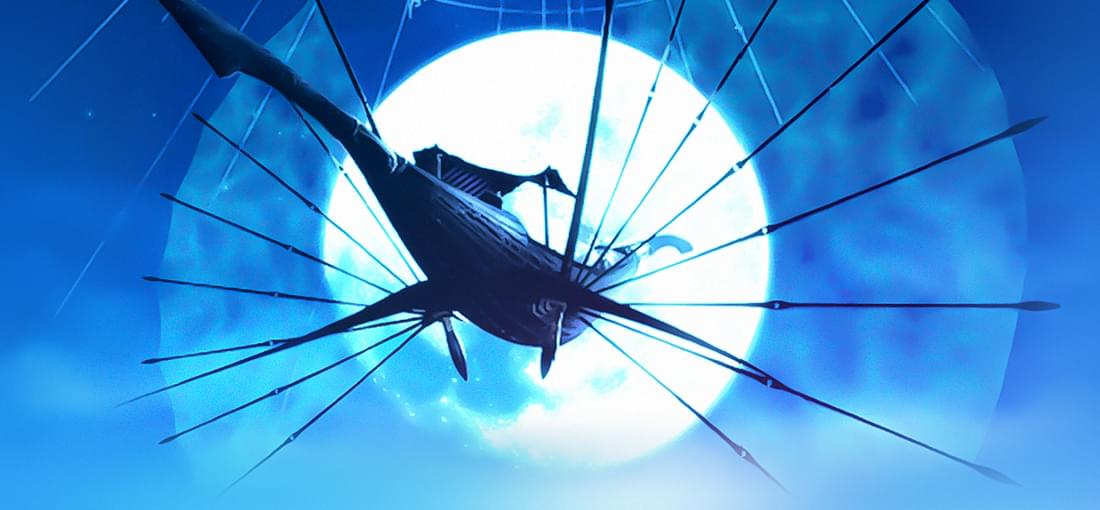
Atlantis is a rather unusual game, with a curious premise, high attention to graphical detail and lofty and complex premise that became hallmarks for Cryo Interactive games. While it's panoramic scenes and prerendered cutscenes are rather nice even today, it's core design is very unlike the Myst-like game it appears to be on the surface; that design makes it a "love it or hate it" title today. Presentation is a huge part of Atlantis so it merits attention. The game feels a little unpolished at times, and character animations look silly today, but it does a lot to imbue a sense of place. Atlantis feels like an advanced bronze-age city, it's palaces, libraries and taverns feel authentic to it's world. It is complemented with a genuinely wonderful soundtrack almost worth the price of admission alone. The game beneath it however feels very different to adventure games of it's time. It's nose-pullingly linear, with a combination of simple inventory object puzzles, boardgame-like (and highly contrived) logic puzzles, and "action sequences" that usually involve finding the correct sequence of actions in either conversations or movement around a scene. These are typically timed and result in many, many game-over screens, before dropping you at a checkpoint to try again. This may sound anathema to the leisurely pace adventure games usually take, and often Atlantis doesn't feel like an adventure game. It's story moves at a break-neck pace, that begins with the kidnapping of the princess of Atlantis and evolves into conspiracies, religious schisms, gender politics and apocalyptic prophecies- with the main character often feeling like the "Running Man" in a world trying to kill him. But somehow it all sort of works. Death is constant, but the brisk pace of play and checkpoint structure means you're never afraid to experiment, and every solved puzzle rewards you with story and more beautiful scenes and music. It's flawed, deeply at times- but I always found it enjoyable.
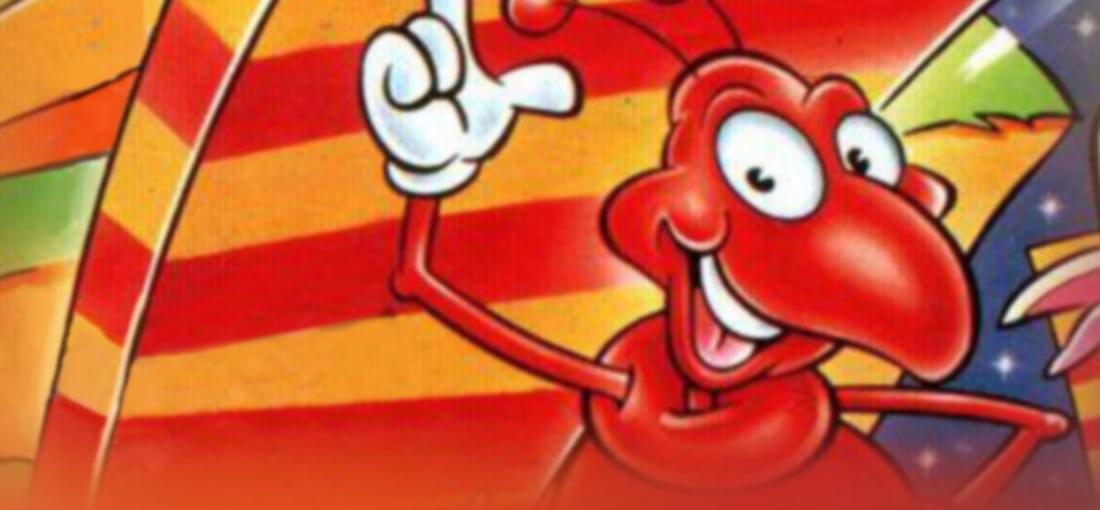
I didn't have high expectations for pushover a $3 DOS puzzle game with promotional branding based on a British cheese snack, and the confusing controls, rigid time limit and very simple gameplay did not look as though they concealed a good puzzle game. And yet, they do. Pushover is unexpectedly quite excellent, and I've never played anything quite like it. Each level requires you to fell every domino on the board, making sure the trigger is the last to fall, and then exiting the level within the allotted time. As the game progresses, the domino trails become increasingly elaborate, using more complex domino types that allow for some very complex behaviours, and puzzles based around positioning and timing. The end result of each puzzle, watching cascading dominoes, reminds me a lot of watching a solution in the incredible machine, with each piece coming together for the solution. It's surprisingly satisfying. The dominoes are locked to a grid, meaning your solutions just need to be logical rather than rigidly precise which is refreshing in a game of it's age. The timer initially can be frustrating, but it typically serves to force the player to think optimally about what changes they need to make- rearranging the whole maze is typically unfeasible. It becomes another dimension to each puzzle, and it works. My main issue with the game is there are 8 domino types that all do very different things, but look very very similar, so reading a domino trail at a glance and knowing what to do can be frustrating, but there's an in-game legend (F1) to help with this. A good puzzle game, for me, is one where the solutions feel logical, are satisfying to arrive at, and become more varied and complex as the game goes on. This checks all the boxes. This is absolutely a hidden gem, and I can't recommend it enough.
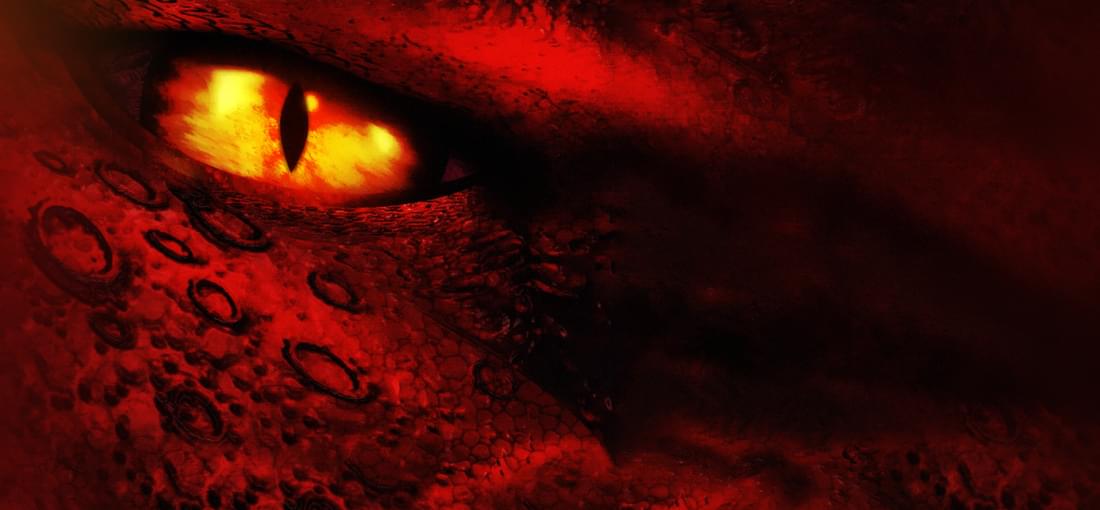
Gorky 17 is a quirky cross-genre game. It's gameplay fits most cleanly into the tactical RPG genre, with it's fixed directional weapons and chess-like mechanics resembling games like fire emblem or shining force, but it borrows many cues from the survival horror genre that work much better than expected. The game borrows from the "Chernobyl" school of horror, with most enemies being irradiated mutants and unethical experiments made manifest. The low-poly blobs of body horror elicit more chuckles than gasps, but the game keeps the action tense by limiting medical supplies and ammunition, and eschewing a rest mechanic. It doesn't take long to realize every rifle bullet needs to be rationed and used to maximum effect, and positioning is critical to minimizing injuries every round. The "survival" emphasis feels novel in a genre awash with uncontrolled power curves. This comes at a cost in complexity, however. Gorky 17 is not a deep RPG. Weapon skills increase with use which is nice, and while level-ups are frequent, the stat increases are small and feel inconsequential. There's very little in the way of customization, and you will almost always base your character progression on what you think will increase survival odds the most- feeling more like a puzzle, than a customizable role. Not a bad thing, but notable. Those chess-like mechanics do break immersion somewhat as well. Most weapons can only be used orthogonally which feels arbitrary, and all creatures block line of sight regardless of size (ankle-biters can and do block brutes the size of a truck)- but these rigid rules make the combat more comprehensible, which is important given how unforgiving it is. Despite it's grimy atmosphere, I found Gorky 17 to be a refreshing experience. Rarely in RPGs do I think about resource consumption beyond the current fight- but here, there is no rest, and no shop. Encouraging players to consider the longer arc of combat is something other games could learn from.

Spellforce is many things. It's a party-based RPG, with a high fantasy setting with plenty of quests, NPCs and exposition to wade through. It's also a RTS, with six playable races with unique(ish) tech trees, units and resources to gather. The genres blend together to feel at times like a standard party based real-time RPG, and at others like a hero based RPG like Warcraft 3. While both genres do things a little differently, technical limitations and some questionable design choices make the game above all a slog to play through. As an RPG, Spellforce feels fairly conventional. You'll have up to 7 units in your party, and access to plenty of abilities and spells across a number of development trees. The freedom is fairly substantial, with a variety of builds possible, though as with most RPGs, specializing is usually advised. The interface for activating abilities is quite clumsy and clicking on targets in the fray can be difficult, but overall the RPG plays okay. For most of the game however, you'll have access to one or more shrines, which are used to produce units for the RTS portion of the game, which is where things falter. You never play against an opponent- rather there are a dozen or so spawn points around the map you need to deactivate, so the enemy is always producing units and always harassing, making progress slow. There are also no siege units, so buildings are slow to destroy- and some levels have dozens of defensive towers in your way to very, very slowly grind through. The RTS maps can take hours to complete, and are devoid of strategy. Spam, grind, repeat. It's hard to stay motivated through the grind because of how staid and generic the world of Eo is, how lifeless the quests and world feel, and the complete lack of personality in the NPCs. It's a competently made game, certainly unique, and not lacking for content- but it's slow, samey game-play means it's unlikely you'll see it through to it's conclusion.
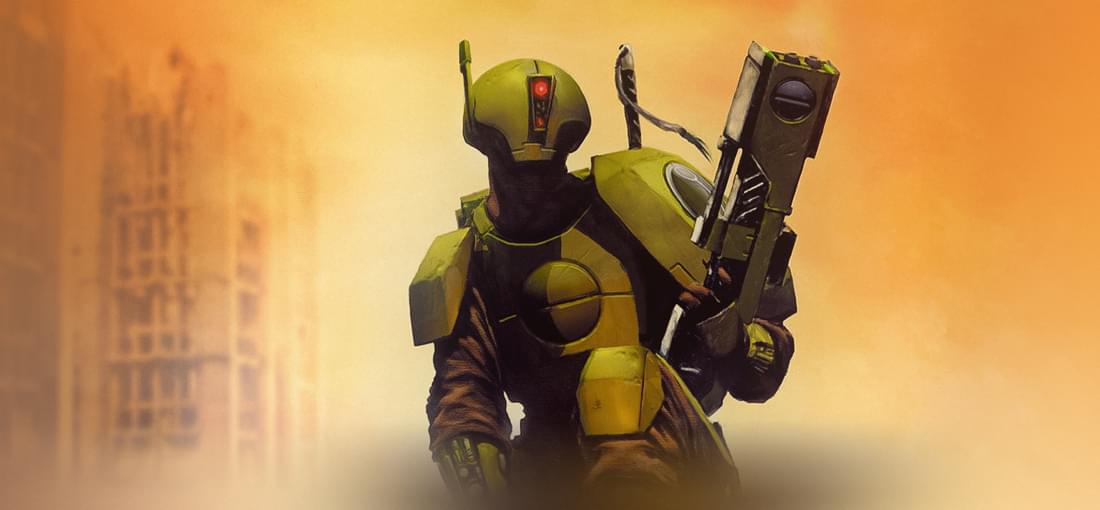
It's almost hard to remember a time when the 40K license was a novelty in games; a handful of SSI-style strategy games used it in the past, which made Fire Warrior a novelty to 40K fans. The question "can we make a shooter out of it" was all too common in the Halo-dominated gaming market of 2003, and Fire Warrior is the predicably mediocre result. The game focuses on the T'au race, eschewing the popularity of the human races in an unusual but somewhat laudable choice. The plot hits many familiar notes for a 40K storyline, starting with an against-the-odds rescue mission, and culminating in fighting the forces of chaos corrupting a human colony; but the pace is plodding and there is very little characterization. The voice acting is average to bad (there are some somewhat problematic accents), and the screenshots tell you all you need to know about the graphics. Gameplay-wise, it feels like a budget 2003 shooter, with heavy design inspiration from Halo- with recharging shields and two weapon slots. It's design nods to other, better games like Deus Ex from time to time as well. Enemies jerk when shot, but the lack of feedback on hit-scan weapons and slow speed of projecties makes the shooting feel anaemic, with no sense of impact. Enemies kind of look like their 40K counterparts, but their mindless, suicidal attack patterns make them a chore to fight. Level design is typically bland but sinks to bad from time to time, with some frustrating boss fights and unobvious destructable level elements that hinders progress. Mostly however, they're featureless, linear corridors peppered with troops to mow through. The only thing that made Fire Warrior distinctive at the time was it's license; a distinction it does not have today, with a new 40K game being released seemingly every other month. Now. it is merely a dull, below-average Halo clone. Relic picked up the license in 2004 to make Dawn of War; if you want to fight humanity as the T'au, that's the game to play.

Those who vaguely remember this one from childhood would be forgiven in forgetting it was developed by Relic, but it's Dawn of War, Company of Heroes heritage quickly makes itself apparent. Impossible Creatures feels simpler, shallower and sillier than it's stablemates but it's core idea of user-designed armies is both innovative and distinctive enough to garner a recommendation. There are over 50 animals in Impossible Creatures, with their own stats, attacks and abilities that can be spliced together, producing a considerable amount of variety in a given player's 9-creature roster. A clever analyzer tool reports how well balanced a custom-made team is, but the real delight in the game comes from testing your new creations with other players to find strengths and weaknesses in a given game. It lends itself well to experimentation and comparisons, as the relatively simple mechanics make it very clear where your team excels, and where it doesn't, and this performance benchmarking afforded much of the fun in the experience for me. This matches well with the simple, lighthearted theme that is consistently charming, and the spectacle of flying scorpions devastating an army of killer whale-gorillas shows how tightly coupled the core gameplay concept is to every part of its presentation. The single-player campaign plays especially well to this, with an additional mechanic of gathering genetic samples to slowly grow your creature library, and a colourful array of heroes and villains. Unfortunately, in some ways it shows it's age; it lacks some quality of life features around unit selection and match setup, and it's relatively small army variety can feel like you're simply throwing units at your enemy after awhile (to some extent, matches are decided before they are played); this all keeps Impossible Creatures from greatness. But it's built on a solid foundation by a company that knows the RTS genre well, and is different enough to stand out from its heritage.
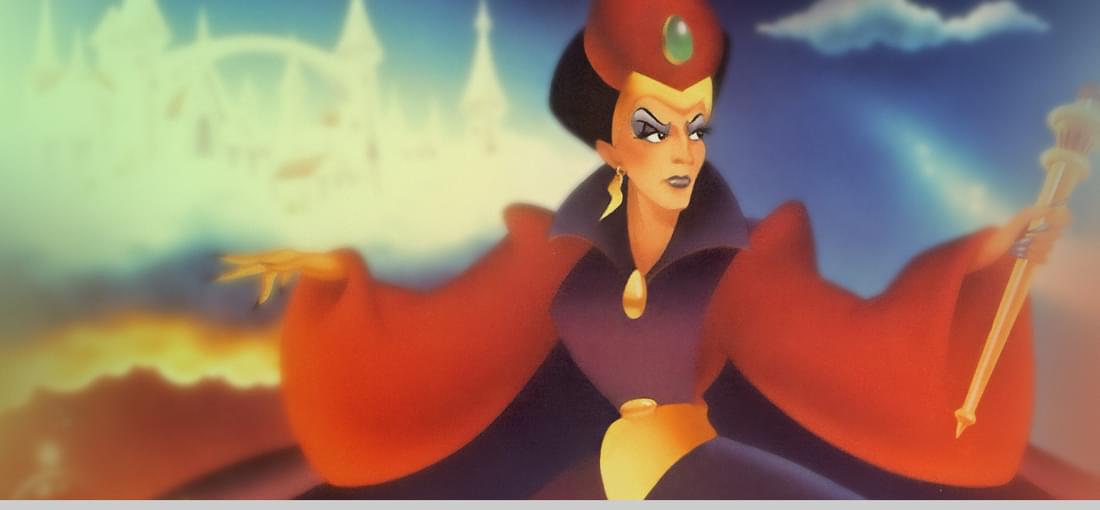
Just talking about KQ VIII here (the "other" game in this package). 1998 was a difficult time for adventure game development, and Sierra knew it. The video game landscape was changing, and the indirect puzzling and plot-driven game play of their adventure line felt antiquated, uninteractive and unexciting as 3D games had found their feet, offering new levels of immersion and interaction. Another Disney-esque romp through fantasy lands would be derided as "last-gen", merits aside. For the franchise to continue, it needed to reinvent itself. Mask of Eternity is what we would today call an action adventure, or perhaps adventure RPG, at least a prototypical one. It combines open environments to explore with melee and ranged combat against various foes. The combat is extremely facile- there is no finesse or strategy to your strikes, and the game provides you will far too many healing items to account for it's uneven difficulty. The environments are standard fare for such a 3D title in 1998, but feel simple and artless attached to the Kings Quest license, so renown for it's charming environs. The odd puzzle does appear from time to time as well- environmental puzzles akin to those in shooters like Hexen 2, again lacking the charm and depth of earlier entries in the series, but that is to be expected. The game is ultimately much too shallow. It's RPG elements and combat are just too simple to hold interest, and it's puzzles too easy. The puzzle of what to do with this storied but aged license was one Sierra did not solve with this game. The game is disliked by fans because the series is inextricably linked with the history of adventure games, a heritage this game sheds distastefully. Just as Pac Man belongs in a blue maze eating fruit, King Graham belongs in a bright forest solving puzzles for fairies and woodland creatures. What should Sierra have done instead? Perhaps, just waited. The new series by The Odd Gentlemen is excellent.